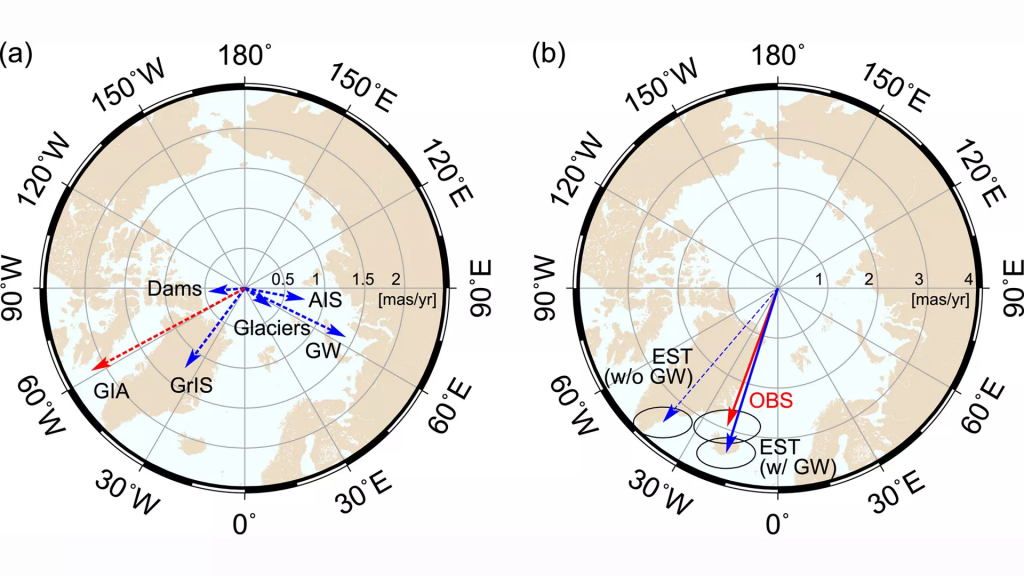In a remarkable revelation, it has been discovered that the Earth’s tilt has been altered by a surprising 31.5 inches (80 centimeters) between 1993 and 2010. The surprising culprit behind this drastic change is none other than the massive extraction of groundwater from deep within our planet.
But what could have caused such a dramatic shift?
The answer lies deep beneath our feet, hidden within the depths of the Earth’s interior. Unbeknownst to us, humans have been depleting groundwater reserves at an alarming rate, extracting a mind-boggling 2,150 gigatons of water from natural reservoirs nestled within the planet’s crust. Little did we realize the repercussions of our actions, as this colossal water displacement has not only affected our precious ecosystems but has also jolted the very axis around which our world spins.

Determined to unravel this enigma, scientists embarked on a quest to understand the intricate dynamics of our planet’s rotational pole. They delved into complex modeling, meticulously charting the changes in the position of the Earth’s imaginary axis—the point that would jut out from the surface if our planet were a tangible object. This point, known as the rotational pole, differs from the familiar north and south poles we are acquainted with, as it gracefully traverses its course, leaving an indelible mark on various regions of our planet’s crust over time.
Prior studies had hinted at climate-related factors influencing the rotational pole, such as the gradual thawing of colossal icebergs and the redistribution of water masses trapped within them. However, it was the inclusion of the massive volume of pumped-out groundwater in their models that finally yielded results aligning perfectly with actual observations. Astonishingly, neglecting the groundwater extraction distorted the model by a staggering 31 inches (78.5 centimeters), illustrating the true magnitude of its impact.
Lead researcher Ki-Weon Seo, a brilliant geophysicist from Seoul National University, shed light on the findings, declaring, “Earth’s rotational pole actually changes a lot. Our study shows that among climate-related causes, the redistribution of groundwater actually has the largest impact on the drift of the rotational pole.”
Seo’s words echo through the scientific community, awakening a newfound appreciation for the far-reaching consequences of our actions.
As the weight of this revelation settles upon us, a pressing question emerges: how does the tilt of our planet’s axis shape the weather patterns we experience throughout the year? Scientists now find themselves pondering the long-term implications of rotational pole shifts on climate change.

Could these subtle shifts contribute to the colossal transformation of our planet’s climate over time?
Seo suggests that scrutinizing changes in the Earth’s rotational pole could unveil vital insights into the variations of water storage on a continental scale. By analyzing polar motion data dating back to the late 19th century, we may learn about hydrological regime changes influenced by a warming climate. The mysteries of the past hold the key to the challenges we face in the future.
It is crucial to comprehend that our planet’s rotational pole remains in perpetual motion, swaying and shifting by several meters every year. The extent to which drained groundwater reservoirs contribute to these mesmerizing movements depends on their geographic location.
Surprisingly, the study unearthed that the extraction of water from mid-latitudes yields the most substantial impact on the Earth’s delicate tilt.

Armed with this newfound knowledge, we stand at a critical juncture. The management of global groundwater movement emerges as a vital solution to curbing rotational pole shifts and mitigating the potential climate consequences that accompany them.
The fate of our planet rests in our hands, urging us to reevaluate our relationship with nature and embrace sustainable practices that safeguard the delicate balance of our wondrous home.


